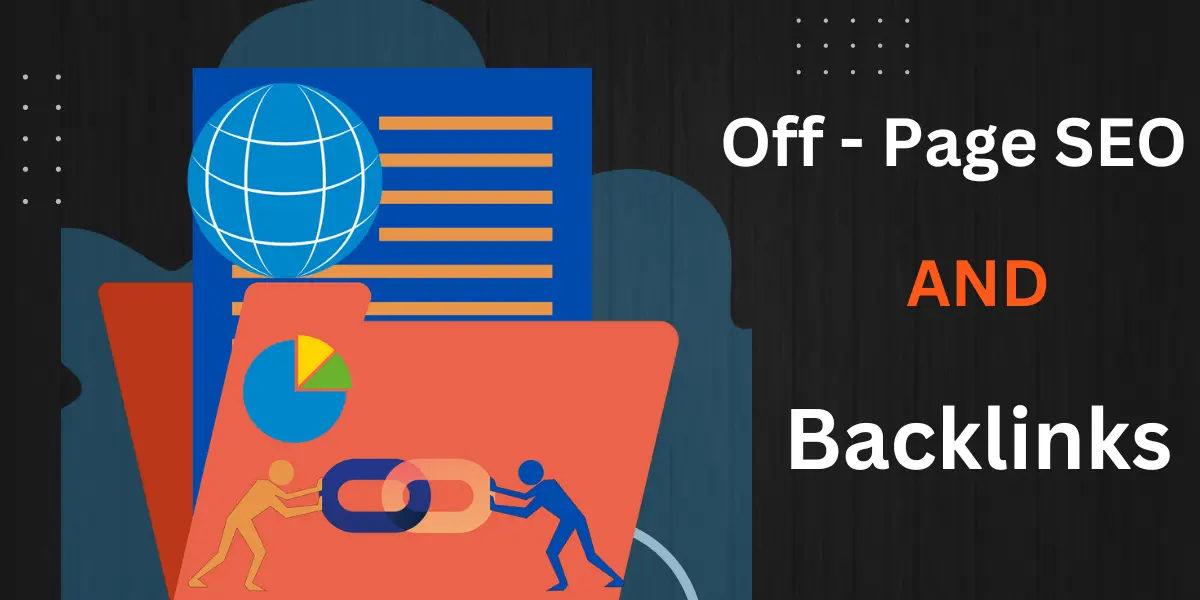Welcome to the intriguing domain of Off-Page SEO and Backlinks, which extends far beyond your website’s content, structure, and technicalities.
While on-page and technical SEO focuses on optimizing your digital property, off-page SEO is about enhancing your website’s authority and relevance in the eyes of search engines through strategies applied outside your website.
This post aims to unravel the complexities of off-page SEO and shed light on backlinks’ pivotal role in advancing your website’s prominence and credibility in search engine rankings.
In the digital era, where content is abundant, search engines like Google have become more discerning and sophisticated in determining the quality and relevance of web pages.
One critical way they assess this is by examining how other websites interact with yours. The logic is simple yet profound: if various reputable websites link to your page, your content is likely valuable and authoritative.
Such external signals serve as endorsements or votes of confidence, persuading search engines to view your website as a trusted resource deserving of higher visibility.
Here, we will dissect the elements that constitute off-page SEO and the practical methodologies for building high-quality backlinks.
We’ll also explore the significance of social signals and the rise of social media SEO, delving into the nuances of how social platforms can indirectly influence your search engine performance.
Additionally, we will offer insights into guest blogging and outreach strategies, an often overlooked but highly effective avenue for building valuable links and establishing authority.
Table of Contents
Importance of Backlinks

In the vast, interconnected web of online information, backlinks are critical pathways that guide search engines and users alike.
If we consider a website a digital real estate property, then backlinks are akin to the roads and highways that lead to it.
Not all roads are created equal; some are well-paved, secure, and direct, while others are treacherous and meandering.
The same analogy applies to backlinks—some are highly valuable, lending authority and credibility to your WordPress website.
In contrast, others can be detrimental, harming your site’s reputation and even incurring penalties from search engines.
The Concept of Authority
One of the core tenets of backlinks lies in the concept of ‘authority.’ Search engines are in the business of providing the most accurate and relevant information to users.
To do this, they must evaluate a web page’s authority and credibility. A high-authority site that links to your page essentially vouches for your content, signaling to search engines that your page, too, should be considered authoritative.
This “vote of confidence” dramatically enhances your site’s potential to rank higher in search engine result pages (SERPs).
The Currency of the Web
Backlinks are the ‘currency’ of the internet. They represent a transaction of trust and authority, contributing value to the recipient’s website and the web.
This mutual exchange can occur organically, such as when a reputable news site references your research study, or it can be engineered through strategic SEO efforts, such as guest posting or influencer outreach.
Regardless of the approach, a robust backlink profile is essential for achieving high SERP rankings.
Quality Over Quantity
In the early years of SEO, the number of backlinks was often considered the most crucial factor for ranking.
Sites would amass thousands of links without much regard for the quality or relevance of those links, leading to a skewed and easily manipulated system.
However, search engines have evolved significantly. Their algorithms have become far more sophisticated, and they now prioritize the quality of backlinks over sheer numbers.
A few high-quality, relevant backlinks from authoritative sites can far outweigh the value of numerous low-quality, irrelevant links.
Anchor Text and Context
The words used to hyperlink to your site, known as anchor text, carry significant weight in SEO. Well-optimized anchor text provides users and search engines with clear context about the content of the link’s destination.
However, over-optimizing anchor text with aggressive keyword targeting can result in penalties. Hence, it’s essential to maintain a natural and varied anchor text profile.
Relevance and Topical Authority
Beyond the concept of general authority, the relevance of a backlink also matters considerably. If your website is focused on health and wellness, a backlink from a reputable medical journal will carry more weight than a link from an automotive blog.
Search engines are increasingly emphasizing topical authority, which focuses on a website’s specific subject matter expertise.
Do-Follow vs. No-Follow Links
In SEO terminology, do-follow links pass on ‘link juice,’ contributing to the recipient site’s authority, while no-follow links do not.
Initially, the no-follow attribute was designed to combat spam and discourage unethical link-building tactics.
However, no-follow links can contribute to a more natural-looking backlink profile and drive valuable referral traffic.
Social Signals and Indirect Impact
Although social signals like likes, shares, and comments on social media platforms are not directly counted as backlinks, they often lead to increased online visibility and natural backlink opportunities.
A blog post that gains traction on social media might attract the attention of bloggers, journalists, or influencers, who may then link to it, offering valuable backlinks indirectly.
Risk of Penalties and the Importance of Monitoring
Wrong links can hurt you. Links from spammy websites or ‘link farms’ can lead to search engine penalties.
Therefore, regular monitoring of your backlinks profile is critical. Tools like Google’s Search Console or various third-party SEO platforms can assist in this, providing comprehensive link analyses and allowing for the repudiation of harmful links.
The Competitive Advantage
Finally, let’s consider backlinks as a competitive edge. Two websites with similar on-page optimization, content quality, and technical SEO could rank differently based on their backlink profiles.
A robust backlink strategy can be the tiebreaker that propels one website ahead of another in SERPs.
Building High-Quality Backlinks
Building high-quality backlinks is like constructing a sturdy, reliable bridge: it’s not just about the number of planks you use but the quality and placement of each piece.
A bridge with a weak foundation will collapse sooner or later, and similarly, a website relying on low-quality backlinks will eventually plummet in search engine rankings.
This section will explore the methods, strategies, and best practices for building high-quality backlinks to enhance your SEO and provide a sustainable competitive edge.
Understanding Link Quality Criteria
Before we delve into strategies, we must understand what makes a backlink ‘high quality.’ Several key factors contribute to the quality of a link:
1. Domain Authority
Links from websites with high domain authority carry more weight than those with low domain authority. Tools like Moz’s Domain Authority or Ahrefs’ Domain Rating can give you an idea of a site’s authority.
2. Relevance
A link from a website in the same or similar industry is more valuable than one from an unrelated field.
3. Anchor Text
The clickable text of the backlink should be relevant to the content it points to and should not be overly stuffed with keywords.
4. Link Position
Links placed within the content, especially near the top, are considered more valuable than links in the footer or sidebar.
5. Follow vs. No-Follow
A ‘Do-follow’ link passes authority to the linked page, whereas a ‘No-follow’ does not. However, having a balanced profile that includes both is often recommended.
6. Traffic
Links from websites that receive high organic traffic are generally more valuable, as they can also direct some of that traffic to your website.
Content Marketing: The Backbone of Link Building
Creating high-quality, shareable content is the cornerstone of most effective link-building strategies. Your content should be well-researched and well-written and offer unique insights or value that makes it link-worthy.
Here are some content types that are particularly effective for earning backlinks:
1. Authoritative Guides and Tutorials
These exhaustive pieces aim to be the ultimate resource on a particular subject.
2. Research Studies and Whitepapers
Original research is a fantastic way to get cited by industry experts.
3. Infographics
Infographics are easily shareable and highly engaging, and they can earn you links from various domains.
4. Videos
Quality video content can earn links from multiple platforms, including social media, YouTube, and a search engine.
Guest Posting
Guest posting has long been a staple strategy for link-building. The key is to write reputable blogs and publications relevant to your industry.
But be wary of sites that openly advertise ‘write for us’ unless they are highly reputable. Often, these sites can be link farms offering little value in link equity.
Influencer Partnerships and Sponsored Content
Collaborating with influencers in your industry can help you reach a broader audience. If the influencer’s values and target audience align with your own, this can be an excellent way to earn high-quality backlinks.
Some influencers naturally share valuable resources with their audience, while others may require sponsored content arrangements.
Resource Link Building
Many websites offer a list of useful links and resources for their audience. If your content fits well and offers value, reaching out to the website and asking for inclusion can yield a high-quality backlink. This is often a straightforward but highly effective strategy.
Unlinked Mentions
Sometimes, other websites will mention your business or content without linking to your site. Tools like Google Alerts, Ahrefs, or Mention can help you find these unlinked mentions.
Once you do, a polite email to the website owner requesting a link often works wonders.
Broken Link Building
Broken link building involves finding broken links on other websites relevant to your content. You then alert the website owner to the broken link and suggest your content as a replacement.
This creates a win-win scenario: You get a high-quality backlink, and the website owner improves the user experience by fixing a broken link.
Directories and Local Citations
For local businesses, listings in high-quality directories can be a valuable source of backlinks. Similarly, earning citations (mentions of your business name and address) on local or industry-specific platforms can indirectly improve your backlink profile.
Social Media and Community Engagement
While most social media links are no-follow and don’t directly contribute to your site’s authority, they help spread your content, leading to more backlinks.
Community sites like Reddit and industry-specific forums can also be great places to share your content and earn links, provided you are an active member who contributes value to the community.
Analyze Competitor Backlinks
One often overlooked strategy for building high-quality backlinks is to analyze where your competitors get them.
Tools like Ahrefs and SEMrush can provide detailed backlink profiles of your competitors. This can serve as a treasure map, guiding you toward link-building opportunities you may have overlooked.
Monitoring and Maintenance
Building high-quality backlinks is not a one-time endeavor but an ongoing process. Utilize tools to monitor your backlink profile regularly, disavowing any toxic or spammy links that could harm your site.
Also, monitor changes in your organic traffic and rankings to measure the effectiveness of your link-building efforts.
Social Signals and Social Media SEO

Social signals and social media SEO may not seem like conventional elements within the traditional scope of SEO, which is often more concerned with keywords, backlinks, and on-page optimizations.
However, as digital landscapes evolve, the interconnectedness of social media and search engine optimization becomes increasingly apparent.
This section explains the importance of social signals and how social media platforms can be leveraged for SEO success.
The Nature of Social Signals
Social signals refer to likes, shares, comments, and overall social media visibility, which correlate to increased online visibility.
Search engines like Google have remained cryptic about the direct impact of social signals on SEO, but the correlation is strong enough to warrant attention.
Here are a few ways social signals might impact SEO:
1. Increased Traffic
Content that gains traction on social media platforms inevitably draws more traffic to the originating site.
2. Content Distribution
The faster your content is disseminated across the web, the quicker it’s likely to be indexed by search engines.
3. Enhanced Brand Recognition
Active and well-received social media profiles can increase brand recognition and influence search behavior.
4. Local Search
Reviews and social engagement can play a role in local search, particularly with platforms like Google My Business.
5. Link Opportunities
Quality content shared across social media could garner the attention of content creators who link to your content, thereby improving your backlink profile.
Building a Cohesive Social Media Strategy for SEO
Understanding the symbiotic relationship between social media and SEO is the first step toward developing a cohesive strategy that amplifies your efforts in both arenas.
Here are some foundational elements:
- Content Consistency: Ensure your content strategy aligns with your brand’s message and voice across your website and social media platforms. This creates a seamless user experience and enhances brand credibility.
- Cross-Promotion: Use your website to boost your social media profiles and vice versa. Integrating social sharing buttons on your site facilitates easier content sharing and increases social signals.
- Keyword Incorporation: Use relevant keywords in your social media posts, descriptions, and images you upload. This can make your social media pages more findable on platforms and search engines.
- Engagement: Focus on creating high-engagement posts that compel users to like, share, and comment. This will increase your posts’ reach, provide valuable feedback, and build community.
Utilizing Specific Platforms for Maximum Impact
Different social media platforms serve various purposes and audiences. Leveraging each platform effectively is essential for a balanced social media SEO strategy:
- Facebook: Great for community building, Facebook allows users to share diverse content types, from posts and images to videos and stories.
- X: Ideal for real-time updates and news dissemination, X’s quick pace is excellent for gaining immediate traction.
- LinkedIn: With its professional slant, LinkedIn is perfect for B2B companies looking to establish thought leadership and engage in networking.
- Instagram: Being image-centric, Instagram is a powerhouse for brand aesthetics and storytelling, especially for B2C brands.
- Pinterest: This platform is excellent for visual discovery, often driving high-quality traffic back to the original website for topics like DIY, fashion, and recipes.
- YouTube: Videos are becoming increasingly crucial for SEO, and YouTube is essentially the second-largest search engine in the world.
Social Media SEO Best Practices
- Regular Posting: Consistency is critical. Keep your audience engaged with regular updates.
- Quality Over Quantity: It’s better to have fewer, high-quality posts that resonate with your audience than to overwhelm them with mediocre content.
- Engage: Don’t just post content; interact with your audience by responding to comments and questions. Take it further by commenting on posts within your industry or niche.
- Analyze and Adjust: Use analytics tools to track your performance. Monitor engagement rates, clickthrough rates, and, of course, conversion rates. Make data-driven adjustments to your strategy.
- Optimized Profiles: Ensure your social media profiles are complete, focusing on keyword optimization. Your profile should indicate what your business does and how it solves problems for its audience.
Monitoring Social Signals for SEO Impact
While the direct impact of social signals on SEO remains a subject of debate within the SEO community, the correlation is indisputable.
Platforms like Google Analytics, BuzzSumo, and various social media analytics tools can help you monitor these signals and their impact on your digital strategy.
- Referral Traffic: Keep track of the traffic directed to your website from social media.
- Mentions and Shares: These can be considered modern-day citations and are a form of validation of your content’s quality.
- Audience Growth Rate: A rapidly growing audience can indicate improved brand awareness, which is worth monitoring.
- Conversion Rate: Ultimately, you want social interactions to lead to conversions. Monitoring how many interactions lead to measurable actions like sales, sign-ups, etc., can provide valuable insights.
Guest Blogging and Outreach Strategies

Guest blogging and outreach strategies are often sidelined in conversations about SEO, especially when compared to seemingly more “central” topics like keyword research or technical SEO.
However, this area is vital for expanding your online presence, generating high-quality backlinks, and positioning your brand as an authority in your field.
What Is Guest Blogging?
Guest blogging is contributing a post to another person’s blog to establish relationships, authority, and links.
Essentially, you write content for another site, usually one with a larger or more specialized audience than yours. In return, you can include a backlink pointing to your website.
Why Is Guest Blogging Important for SEO?
Here are some of the reasons why guest blogging is crucial for a holistic SEO strategy:
- High-Quality Backlinks: One of the main benefits of guest blogging is the high-quality backlinks you’ll receive in return. Search engines view these links as endorsements of your content’s quality, which can significantly boost your site’s SEO.
- Authority Building: Writing for reputable websites positions you as an authority in your niche. This authority appeals to search engines and potential customers who view your content as trustworthy.
- Relationship Building: In the world of digital marketing, relationships are gold. Guest blogging allows you to establish beneficial relationships with other industry leaders, who may later be open to collaborations or partnerships.
- Audience Exposure: By guest blogging on a site with a substantial following, you can reach an entirely new set of potential customers, subscribers, or readers.
Identifying Opportunities for Guest Blogging
Before you dive into the writing aspect, it’s essential to identify suitable blogs for guest posting. Here’s how:
- Industry Relevance: The blog should be related to your industry or niche. If you sell software, a guest post on a fashion blog might not be the best fit.
- Audience Compatibility: Ensure the blog’s audience aligns with your target demographic.
- Quality Metrics: Check metrics like domain authority, monthly traffic, and engagement rates to ensure the blog meets your quality standards.
- Content Quality: A quick review of existing content can tell you much about the blog’s quality. Is the content well-written, well-researched, and thorough?
- Backlink Quality: Some blogs may allow only nofollow links or none. To maximize SEO benefits, ensure the blog you choose enables do-follow backlinks.
Outreach Strategies
Once you have a list of target blogs, the next step is to contact them with your guest post proposal.
Here are some best practices:
- Personalization: Address the blog owner by name and comment on a specific aspect of their blog that you admire. This shows that you’ve done your homework.
- Pitching: In your pitch, offer several topic ideas and briefly outline what each post would cover. Make it clear how your post will bring value to their readers.
- Follow-Up: If you don’t receive a response within a week or two, you should often send a follow-up email.
Crafting the Perfect Guest Post
Once your pitch is accepted, it’s time to deliver a stellar guest post. Keep these pointers in mind:
- Adhere to Guidelines: Many blogs have guest post guidelines. Be sure to read and follow them.
- Quality Is King: Your post should be well-researched, well-written, and free of grammatical errors. Aim for a comprehensive coverage of your chosen topic.
- Subtle Self-Promotion: While the primary goal is to provide value to the reader, subtle promotion can help you get the most out of your guest post. This can be a backlink, a mention of your product (if appropriate), or a call-to-action leading to your site.
- Optimization: Like the content on your site, the guest post should be optimized for SEO. This includes proper keyword usage, meta descriptions, and formatting.
Building and Nurturing Relationships
After your post is published, engage with the audience by responding to comments and sharing the post on social media. This fosters community and can lead to future guest posting opportunities.
- Thank You Note: A simple thank-you note can go a long way in relationship building. It’s a small gesture that shows appreciation and professionalism.
- Regular Contributions: If your post performs well, the blog owner may be open to making you a regular contributor. This can provide a steady stream of quality backlinks and increased authority in your niche.
- Reciprocal Guest Posts: Once you have a good relationship with a blog owner, you can invite them to guest post on your blog. This reciprocity can amplify the benefits of guest blogging for both parties.
Wrapping Up
In summary, backlinks are indispensable to any serious SEO strategy. They help build authority, improve SERP rankings, drive targeted traffic, and offer a competitive advantage.
However, the world of backlinks is nuanced and ever-evolving. The quality, relevance, and diversity of links matter.
Understanding these subtleties and continuously adapting your backlink strategy can make the difference between SEO mediocrity and excellence.
So, as you step further into the realm of SEO, treat backlink building with the seriousness and strategic thinking it warrants. This will elevate your SEO game and set the foundation for sustainable long-term success.
Building high-quality backlinks is a nuanced and multifaceted endeavor that requires strategic thinking, creativity, and diligence.
It involves more than just acquiring as many links as possible; it’s about earning links that contribute to your site’s authority and relevance.
Whether you’re a small business owner or a seasoned SEO expert, effective link-building remains one of SEO’s most challenging and rewarding aspects.
When executed correctly, it provides a robust foundation for long-term success, helping you rank higher, attract more organic traffic, and achieve your business goals.
Social signals and social media SEO represent an evolving frontier in the broader field of search engine optimization.
The dynamic nature of social media platforms offers fertile ground for brand building, audience engagement, and, most importantly, for generating robust, natural signals that search engines can interpret as indicators of credibility and authority.
By creating a well-rounded, informed, and agile social media SEO strategy, businesses can enhance their SEO and generate more touchpoints for customer engagement, traffic driving, and overall brand building.
In today’s digitized world, SEO doesn’t end at your website; it extends into the social sphere, and mastering this domain can give you an edge in an increasingly competitive digital marketplace.
Guest blogging and outreach are powerful tactics that can significantly boost your SEO efforts. However, they may seem like a lot of work initially, but the long-term benefits far outweigh the time and effort invested.
From generating high-quality backlinks and establishing authority to building lasting industry relationships, the multifaceted benefits of guest blogging should not be ignored in any comprehensive SEO strategy.
That all. Let’s meet in the comments column below.
Let us discuss this.
If you liked this article, Off-Page SEO and Backlinks: The Complete Beginners Guides. Please follow us on the following Social Networking:
- Find Us On Facebook
- Connect with WordPress Experts and other WordPress Users in our free Facebook Community.
- Join Us On Twitter
- Follow Us On the Telegram Group
- Find Us On the WhatsApp Channel
- You can also reach Us by using the Contact Form.
- Also, find Our Blog Page for more tutorials.
- Follow Us On Google News for more updates.




